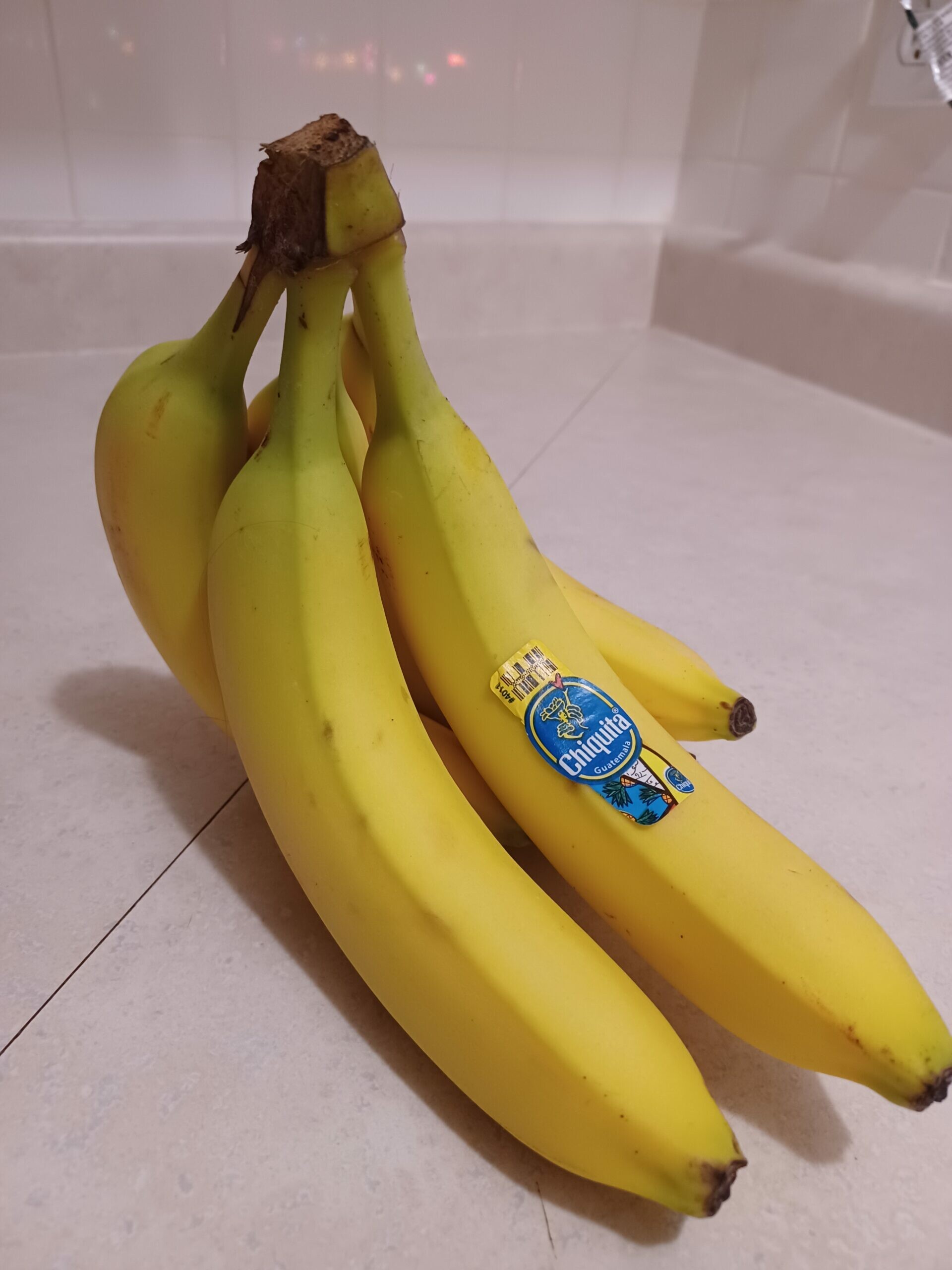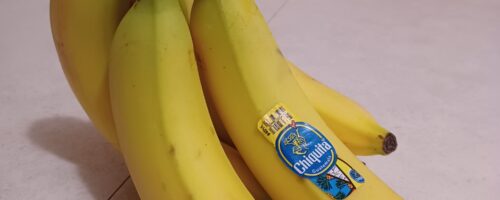
Omagua Banana Plantation, Santo Tomás de Castilla, Guatemala
How is it produced?
Bananas require a warm and wet climate to thrive. Most bananas are grown within 30 degrees of the equator, in this case, Guatemala. Most Cavendish Bananas, including this bunch from Chiquita’s Omagua Banana Plantation in the Santo Tomás de Castilla region, are grown on massive plantations. Because these plantations are made up of a monoculture and do not practice crop rotation, bananas require large amounts of pesticides and insecticides to thrive. These chemicals are highly toxic to the workers and the surrounding environment. Most plantations harvest their bananas green and ripen them in warehouses in the country of their destination.
Describe the supply chain to the store shelf in Canada:
This bunch was grown on a large plantation in the Santo Tomás de Castilla region. From there, Chiquita trucked them by the pallet to Terminal Ferroviaria de Puerto Barrios where they were loaded into refrigerated containers. Next, they were shipped to North America where they were taken to a distribution centre. There they are ripened using ethylene gas. Once ripe, they are shipped to Sobey’s distribution warehouse. Sobey’s own Freshco and they are owned by Empire Company. From their warehouse, this bunch was shipped in their pallet to the Vernon Freshco where I found them.
What is the power balance between the producer and seller?
The power imbalance between Chiquita and their workers is massive. The U.S.-based multinational banana company’s list of strange dark dealings would almost read as funny if they did not have such violent consequences. To name a few, in 1954 the company (then known as the United Fruit Company) worked with the CIA to overthrow Guatemala’s leftist government and stop their growing land from being redistributed to peasants. This threw the country into a civil war. They leant some of their transport ships to the U.S. Government for use in the Bay of Pigs operation. They were fined 25 million in 2007 for paying a terrorist organization for security for their executives and land and have been known to kill union leaders in Columbia. Meanwhile, workers earn as little as $3 a day and suffer horrible health problems as a result of the chemicals used.
There is also a power imbalance between the producer and the consumer. In 1997, the E.U. was found to violate the GAT’s (now WTO) Most Favoured Nation rule. This was in response to a complaint launched by Ecuador, Guatemala, Honduras, Mexico and the United States -all lobbied by large banana companies- about the E.U.’s quota and tariff system. This system, they said, unfairly favoured bananas from Caribbean countries. After lengthy legal battles, the E.U. changed to a tariff-only system and the E.U. was no longer able to choose where they sourced their bananas. Were they used to buy more from smaller, family-run farms in the Caribbean, they now lost their ability to choose those bananas over ones grown in the plaintive countries often on large plantations. In doing this, the WTO has demonstrated that corporations have power over nations and consumers and that they will side with the plight of the corporations.
Can you recommend changes to the system to improve the balance?
The power of corporations and their support from the WTO’s is a reality that unfortunately can not be changed. In many ways, they control what ends up on the shelves available to consumers. There is not currently a way to hold multinationals accountable for their actions across international borders. In the case of Chiquita’s terrorism payment conviction, the U.S. Justice Department acted as supervisory accountability. But they were charged as an American company that was engaging in acts that would potentially endanger the American people. The cosmopolitan idea of upholding human rights for all people played no role in that charge. A form of international rules holding corporations to an environmental and human rights standard would be the ideal response to this. The global economy has advanced faster than regulations can keep up with it and people are suffering the consequences. This sort of institutional cosmopolitanism framework would mean some form of global governance which, as Rodrk noted in this book, is excruciatingly complicated, if not impossible, to build.
In the absence of international justice mechanisms, the role of holding corporations accountable falls to the market. If consumers do not buy from Chiquita or choose to support Fairtrade plantations instead, market practices would be forced to change. The difficult part about this is that what ends up on the shelves, especially at an affordable price, is heavily influenced by MFN and similar rules. These bananas were bought at Freshco, a store that I (like many others) go to because it is cheap and within walking distance of my apartment. To expect consumers on the edge of poverty to spend more on responsibly sourced bananas is a perversely out-of-touch expectation. Bananas are a cheap source of fruit. While not buying bananas is certainly an option, they are for better or for worse a staple of Canadian diets. In the end, this is a complicated problem. I certainly feel that will be avoiding bananas for a while after this paper and eating some other cheap fruit (or less fruit), it comes down to doing what you can. If they can, I would recommend consumers avoid buying Chiquita’s bananas in favour of organic ones grown on fair trade plantations as consumers are the only real form of accountability in the current system.
References/Resources:

